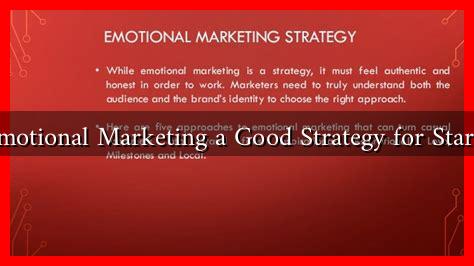-
Table of Contents
Is Emotional Marketing a Good Strategy for Startups?
In the competitive landscape of startups, where resources are often limited and brand recognition is still in its infancy, emotional marketing has emerged as a powerful strategy. This approach leverages the emotional responses of consumers to create a deeper connection with a brand, ultimately driving engagement and loyalty. But is emotional marketing a good strategy for startups? In this article, we will explore the benefits, challenges, and best practices of emotional marketing for new businesses.
Understanding Emotional Marketing
Emotional marketing is a strategy that aims to evoke specific feelings in consumers to influence their purchasing decisions. By tapping into emotions such as happiness, fear, nostalgia, or empathy, brands can create memorable experiences that resonate with their audience. According to a study by the American Marketing Association, emotionally connected customers are more than twice as valuable as highly satisfied customers.
The Benefits of Emotional Marketing for Startups
For startups, emotional marketing can offer several advantages:
- Brand Differentiation: In a crowded market, emotional marketing helps startups stand out by creating a unique brand identity that resonates with consumers.
- Increased Customer Loyalty: When customers feel an emotional connection to a brand, they are more likely to remain loyal, even in the face of competition.
- Higher Engagement Rates: Content that evokes emotions tends to be shared more frequently on social media, increasing brand visibility and reach.
- Improved Conversion Rates: Emotional appeals can lead to higher conversion rates, as consumers are more likely to make purchases when they feel a connection to a brand.
Challenges of Implementing Emotional Marketing
While emotional marketing can be highly effective, it also comes with its own set of challenges, particularly for startups:
- Resource Constraints: Startups often operate with limited budgets and manpower, making it difficult to create high-quality emotional marketing campaigns.
- Understanding the Target Audience: Successfully tapping into emotions requires a deep understanding of the target audience, which can be challenging for new businesses still defining their market.
- Risk of Misalignment: If the emotional message does not align with the brand’s values or the product being offered, it can lead to consumer distrust and backlash.
Successful Examples of Emotional Marketing
Several startups have successfully utilized emotional marketing to build their brands:
- Airbnb: The company’s “Belong Anywhere” campaign focuses on the emotional aspect of travel, emphasizing the feeling of belonging and connection that comes from staying in someone’s home.
- Warby Parker: This eyewear startup uses storytelling to connect with customers, sharing narratives about how their glasses help people see better and improve their lives.
- Charity: Water: This nonprofit startup effectively uses emotional storytelling to highlight the impact of clean water on communities, driving donations through powerful narratives.
Best Practices for Startups Using Emotional Marketing
To effectively implement emotional marketing, startups should consider the following best practices:
- Know Your Audience: Conduct thorough market research to understand the emotions that resonate with your target demographic.
- Be Authentic: Ensure that your emotional messaging aligns with your brand values and mission to build trust with your audience.
- Utilize Storytelling: Craft compelling narratives that evoke emotions and connect with your audience on a personal level.
- Measure and Adapt: Use analytics to track the effectiveness of your emotional marketing campaigns and be willing to adapt based on feedback and performance.
Conclusion
Emotional marketing can be a highly effective strategy for startups looking to differentiate themselves in a competitive market. By creating emotional connections with consumers, startups can foster loyalty, increase engagement, and drive conversions. However, it is essential to navigate the challenges of resource constraints and audience understanding carefully. By following best practices and learning from successful examples, startups can harness the power of emotional marketing to build a strong brand presence and achieve long-term success.

